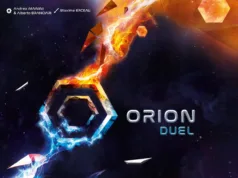 In the illustrious canon of Stefan Feld games, Luna might be the least “Feld” Feld there is. There are glimpses of his standard fare here—negative points if you position your workers poorly, action tokens that are difficult to acquire—but at its core, Luna is essentially a tactical worker placement game. The designer often takes random elements like die rolls or card draws and layers numerous options over top of them, not so much to mitigate any negative results, but rather to force players to adapt to an uncontrollable gameplay element. Luna has no random events, allowing players complete control over the arc of the game. Oh, and the workers are called “novices.” Because… theme!
In the illustrious canon of Stefan Feld games, Luna might be the least “Feld” Feld there is. There are glimpses of his standard fare here—negative points if you position your workers poorly, action tokens that are difficult to acquire—but at its core, Luna is essentially a tactical worker placement game. The designer often takes random elements like die rolls or card draws and layers numerous options over top of them, not so much to mitigate any negative results, but rather to force players to adapt to an uncontrollable gameplay element. Luna has no random events, allowing players complete control over the arc of the game. Oh, and the workers are called “novices.” Because… theme!
Gameplay Overview:
The game is played over six rounds during which players can take actions with their workers (aka novices) as they move around a series of floating isles to impress Luna, the Moon Priestess. Each isle has a different action token that players can claim, but it will take careful planning as moving a novice deactivates them until the next round. Several of the movement tokens assist players in plotting exactly where they want their novices to be, while others provide bonuses such as reactivating previously used novices and money to bribe guards (more on bribing people later).
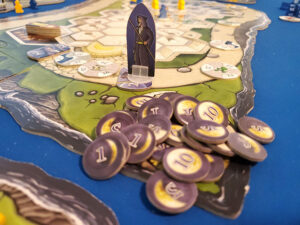
While at these isles, players can use their novices to claim certain temple tiles in an attempt to enter the game’s central temple board. Having novices in the temple grants points at the end of the round, but, beware, competing novices can kick you out of the temple if they decide to sit next to you and are studying a discipline that has a higher number value than you do (the theme is wearing pretty thin at this point).
Points are straightforward. You score for being active and on the same isle as Luna, for getting into the temple and staying in each round, and at the end of the game each shrine you’ve managed to build gets you four more. The game ends after six rounds at which point Luna will decide which of her worshipers are devout enough to choose the next Moon Priestess.
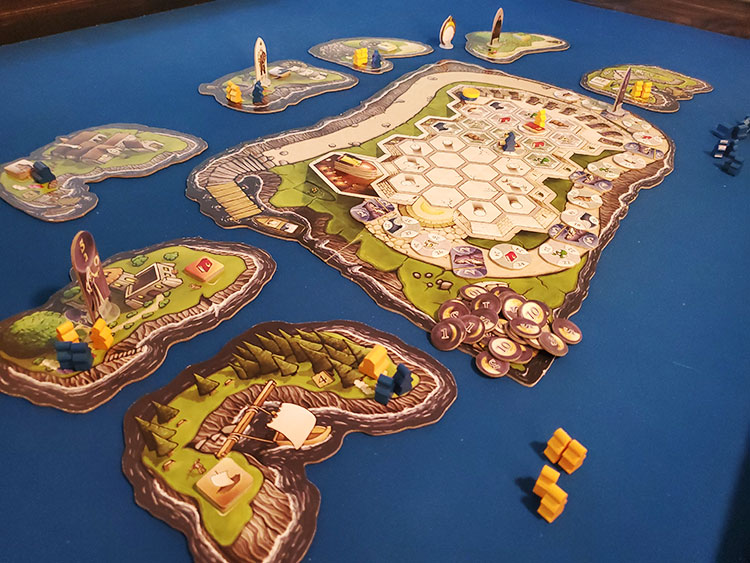
Game Experience:
Overall, the components in the game are pretty good although some of the art is a little cartoony on the isle boards themselves. The iconography is minimal and the player aids are only moderately helpful given how clunky some of the movement and token rules are. Things just aren’t particularly intuitive (a problem Feld’s Forum Trajanum also had), and Luna’s rulebook is awkwardly written. Setting up the game is also fairly confusing and once you figure it out, you’ll probably conclude you could have explained the process better yourself if given the chance.
The structure of the game is interesting: There aren’t traditional rounds and each phase of the game is dictated by the number of times players decide to pass. Passing isn’t simply an action you take when you’re out of novices, but rather becomes a push and pull between the people at the table. Do I keep positioning my novices to set up this or future rounds? Or do I pass and watch where everyone else will land in order to line myself up near the standee of the titular Luna whose company will grant me the most points at the end of each round? Pass too often or at the wrong time, however, and the other players might choose to end the round, giving them a round-end bonus.
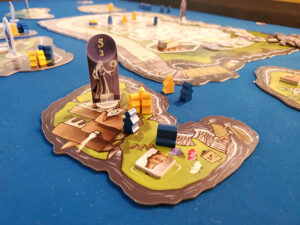
This tension is present but is hardly the main thrust of the game’s mechanisms. Moving your novices from isle to isle and deactivating them as they travel is pretty fiddly and, seeing as how it’s the bulk of the gameplay, not as satisfying as, say, dropping a Castles of Burgundy hex with three pigs on it next to one with two pigs on it (five pigs = five instant points, folks!). In Luna, the scoring mostly takes place at the end of the round, which is fine, but less rewarding than a standard Feldian (that’s a word right?) point salad.
One aspect of the game that’s both intriguing and frustrating is the movement into the game’s central temple. Doing so allows you to bump other players’ novices out of the temple, thereby preventing them from scoring later. The numbered temple system is neat, but the terms used to describe this phenomenon are impossible to comprehend.
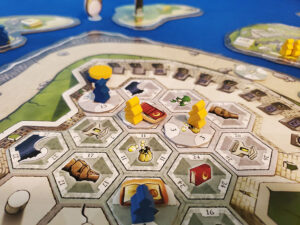
Certain temple tiles are “unapproved” for a while and you can only access them by “bribing” a guard with a token. Once you get into the temple, you can only bump people on a lower-numbered tile so long as they’re not protected by a book. I guess this is a metaphor for knowledge being the equivalent of physical power, but all I could picture in these scenarios was one Luna-worshipping novice fighting off another by physically thrashing them with a large book.
Feld has never met a theme he couldn’t paste on and this one feels particularly contrived. Unique? Sure, but the theme here doesn’t help explain any of the rules, and not once did I feel like I was actually trying to impress Luna. It’s more like I was just chasing her around the island while avoiding the game’s villain(?), an apostate who deducts points from you if you end up near him. Players can also try to cozy up to the builder who will help them build shrines on the various isles, thus awarding them four points at the game’s end and providing a reduction in the cost of action tiles, but the process requires two novices, a token, and close proximity to the builder, which could take three full turns to finagle.
Final Thoughts:
All that being said, there’s a lot to like in Luna. The tactical nature of acquiring and placing the temple tiles is enjoyable as is waiting to see what actions your opponents will take. The game’s flaws lie more in the tangle of mechanisms around this tactical positioning. And acquiring the special tokens that allow you to move more freely requires the use of precious novices that are in short supply right from the start (and good luck building as many of those shrines as you want). In a way, that’s the main part of the appeal I suppose – maximizing actions in a restrictive atmosphere. But it’s less fun than it probably could have been.
Final Score: 3.5 Stars – A departure from Stefan Feld’s usual style is an interesting mix of worker placement and tile laying that suffers from a few clunky mechanisms and a confounding theme.
 Hits:
Hits:
• Interesting take on worker placement
• Straightforward scoring
• Plays quickly from turn to turn
Misses:
• Rulebook could have been clearer
• Theme, while unique, doesn’t really fit the mechanics









